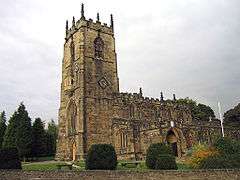Royston, South Yorkshire
| Royston | |
 Parish Church of St John the Baptist |
|
 Royston |
|
| Population | 10,728 (Ward 2011) |
|---|---|
| OS grid reference | SE3511 |
| Metropolitan borough | Barnsley |
| Metropolitan county | South Yorkshire |
| Region | Yorkshire and the Humber |
| Country | England |
| Sovereign state | United Kingdom |
| Post town | BARNSLEY |
| Postcode district | S71 |
| Dialling code | 01226 |
| Police | South Yorkshire |
| Fire | South Yorkshire |
| Ambulance | Yorkshire |
| EU Parliament | Yorkshire and the Humber |
| UK Parliament | Barnsley Central |
Coordinates: 53°37′N 1°27′W / 53.61°N 1.45°W
Royston is a suburban village within the Metropolitan borough of Barnsley, in South Yorkshire, England. Historically part of the West Riding of Yorkshire, but was incorporated into the Metropolitan borough of Barnsley in 1974 and is now on the border with West Yorkshire. It is part of the Barnsley Central borough constituency, and has a population of 9,375,[1] increasing to 10,728 at the 2011 Census.[2]
History
Originally a farming village, Royston joined the Industrial Revolution with the construction in the 1790s of the Barnsley Canal, and later a branch of the Midland Railway. Both are now disused. Royston had a colliery, a clay works and brick works but these are all now closed, although a coke works operated until recently on the mine site processing coal brought in by road. A large shirt factory with the brandname Valusta provided local employment from the 1940s through to the 1980s.
Geography
Royston lies on the Barnsley Canal, and on the intersection of the B6132 and B6428 roads, due north of Monk Bretton at an elevation of around 246 feet above sea level. The Trans Pennine Trail runs through Royston along the canal bank. The parish is part of the diocese of Wakefield.
Landmarks
The churches in Royston include the Anglican parish church of St John the Baptist, Bethel Church, the Royston Methodist Church, and Our Lady and St Joseph, a Roman Catholic church.
- Royston Parish Church of St. John the Baptist
The parish church of St John the Baptist was built about the year 1234 and has a clock, a sundial and a ring of eight bells. The church is a notable location in Royston as it is one of three churches in England with an oriel window and was used a navigational landmark for guiding travellers.
Notable people
Harry Shake Earnshaw was a miner turned racing cyclist who in 1938 was acclaimed the British Best All-Rounder. Royston is the birthplace of comedian Charlie Williams. The mountaineer Andy Cave originates from Royston, and was a coal miner until the 1984-85 miners' strike, at which point he dedicated himself to mountaineering. He is also notable for his research into the dialect of Yorkshire pit villages. His 2001 doctorate stated that Royston had a slightly different accent to the surrounding villages, as many of the miners who came to work at Monkton Colliery on its opening travelled from the Black Country, where several mines had closed.[3]
The comedian Charlie Williams was born in Royston in 1927. He played football for Doncaster Rovers and later found fame as one of the comedians on the TV programme The Comedians.
See also
- List of Yorkshire Pits
- Royston and Notton railway station (closed 1968)
- Notton and Royston railway station (closed 1930).
References
- ↑ "Usual Resident Population". Office for National Statistics. Retrieved 26 August 2009.
- ↑ "Barnsley MBC Ward population 2011". Neighbourhood Statistics. Office for National Statistics. Retrieved 4 March 2016.
- ↑ Cave, Andrew (2001). "Language variety and communicative style as local and subcultural identity in a South Yorkshire coal mining community". The University of Sheffield. Retrieved 21 July 2013.